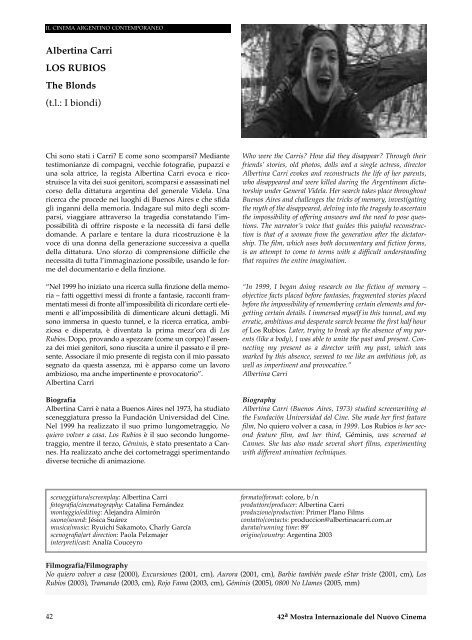Catalogo - Mostra internazionale del nuovo cinema
Catalogo - Mostra internazionale del nuovo cinema
Catalogo - Mostra internazionale del nuovo cinema
Create successful ePaper yourself
Turn your PDF publications into a flip-book with our unique Google optimized e-Paper software.
IL CINEMA ARGENTINO CONTEMPORANEO<br />
Albertina Carri<br />
LOS RUBIOS<br />
The Blonds<br />
(t.l.: I biondi)<br />
Chi sono stati i Carri? E come sono scomparsi? Mediante<br />
testimonianze di compagni, vecchie fotografie, pupazzi e<br />
una sola attrice, la regista Albertina Carri evoca e ricostruisce<br />
la vita dei suoi genitori, scomparsi e assassinati nel<br />
corso <strong>del</strong>la dittatura argentina <strong>del</strong> generale Vi<strong>del</strong>a. Una<br />
ricerca che procede nei luoghi di Buenos Aires e che sfida<br />
gli inganni <strong>del</strong>la memoria. Indagare sul mito degli scomparsi,<br />
viaggiare attraverso la tragedia constatando l’impossibilità<br />
di offrire risposte e la necessità di farsi <strong>del</strong>le<br />
domande. A parlare e tentare la dura ricostruzione è la<br />
voce di una donna <strong>del</strong>la generazione successiva a quella<br />
<strong>del</strong>la dittatura. Uno sforzo di comprensione difficile che<br />
necessita di tutta l’immaginazione possibile, usando le forme<br />
<strong>del</strong> documentario e <strong>del</strong>la finzione.<br />
“Nel 1999 ho iniziato una ricerca sulla finzione <strong>del</strong>la memoria<br />
– fatti oggettivi messi di fronte a fantasie, racconti frammentati<br />
messi di fronte all’impossibilità di ricordare certi elementi<br />
e all’impossibilità di dimenticare alcuni dettagli. Mi<br />
sono immersa in questo tunnel, e la ricerca erratica, ambiziosa<br />
e disperata, è diventata la prima mezz’ora di Los<br />
Rubios. Dopo, provando a spezzare (come un corpo) l’assenza<br />
dei miei genitori, sono riuscita a unire il passato e il presente.<br />
Associare il mio presente di regista con il mio passato<br />
segnato da questa assenza, mi è apparso come un lavoro<br />
ambizioso, ma anche impertinente e provocatorio”.<br />
Albertina Carri<br />
Biografia<br />
Albertina Carri è nata a Buenos Aires nel 1973, ha studiato<br />
sceneggiatura presso la Fundación Universidad <strong>del</strong> Cine.<br />
Nel 1999 ha realizzato il suo primo lungometraggio, No<br />
quiero volver a casa. Los Rubios è il suo secondo lungometraggio,<br />
mentre il terzo, Géminis, è stato presentato a Cannes.<br />
Ha realizzato anche dei cortometraggi sperimentando<br />
diverse tecniche di animazione.<br />
sceneggiatura/screenplay: Albertina Carri<br />
fotografia/<strong>cinema</strong>tography: Catalina Fernández<br />
montaggio/editing: Alejandra Almirón<br />
suono/sound: Jésica Suárez<br />
musica/music: Ryuichi Sakamoto, Charly García<br />
scenografia/art direction: Paola Pelzmajer<br />
interpreti/cast: Analía Couceyro<br />
42<br />
Who were the Carris? How did they disappear? Through their<br />
friends’ stories, old photos, dolls and a single actress, director<br />
Albertina Carri evokes and reconstructs the life of her parents,<br />
who disappeared and were killed during the Argentinean dictatorship<br />
under General Vi<strong>del</strong>a. Her search takes place throughout<br />
Buenos Aires and challenges the tricks of memory, investigating<br />
the myth of the disappeared, <strong>del</strong>ving into the tragedy to ascertain<br />
the impossibility of offering answers and the need to pose questions.<br />
The narrator’s voice that guides this painful reconstruction<br />
is that of a woman from the generation after the dictatorship.<br />
The film, which uses both documentary and fiction forms,<br />
is an attempt to come to terms with a difficult understanding<br />
that requires the entire imagination.<br />
“In 1999, I began doing research on the fiction of memory –<br />
objective facts placed before fantasies, fragmented stories placed<br />
before the impossibility of remembering certain elements and forgetting<br />
certain details. I immersed myself in this tunnel, and my<br />
erratic, ambitious and desperate search became the first half hour<br />
of Los Rubios. Later, trying to break up the absence of my parents<br />
(like a body), I was able to unite the past and present. Connecting<br />
my present as a director with my past, which was<br />
marked by this absence, seemed to me like an ambitious job, as<br />
well as impertinent and provocative.”<br />
Albertina Carri<br />
Biography<br />
Albertina Carri (Buenos Aires, 1973) studied screenwriting at<br />
the Fundación Universidad <strong>del</strong> Cine. She made her first feature<br />
film, No quiero volver a casa, in 1999. Los Rubios is her second<br />
feature film, and her third, Géminis, was screened at<br />
Cannes. She has also made several short films, experimenting<br />
with different animation techniques.<br />
formato/format: colore, b/n<br />
produttore/producer: Albertina Carri<br />
produzione/production: Primer Plano Films<br />
contatto/contacts: produccion@albertinacarri.com.ar<br />
durata/running time: 89'<br />
origine/country: Argentina 2003<br />
Filmografia/Filmography<br />
No quiero volver a casa (2000), Excursiones (2001, cm), Aurora (2001, cm), Barbie también puede eStar triste (2001, cm), Los<br />
Rubios (2003), Tramando (2003, cm), Rojo Fama (2003, cm), Géminis (2005), 0800 No Llames (2005, mm)<br />
42 a <strong>Mostra</strong> Internazionale <strong>del</strong> Nuovo Cinema

















